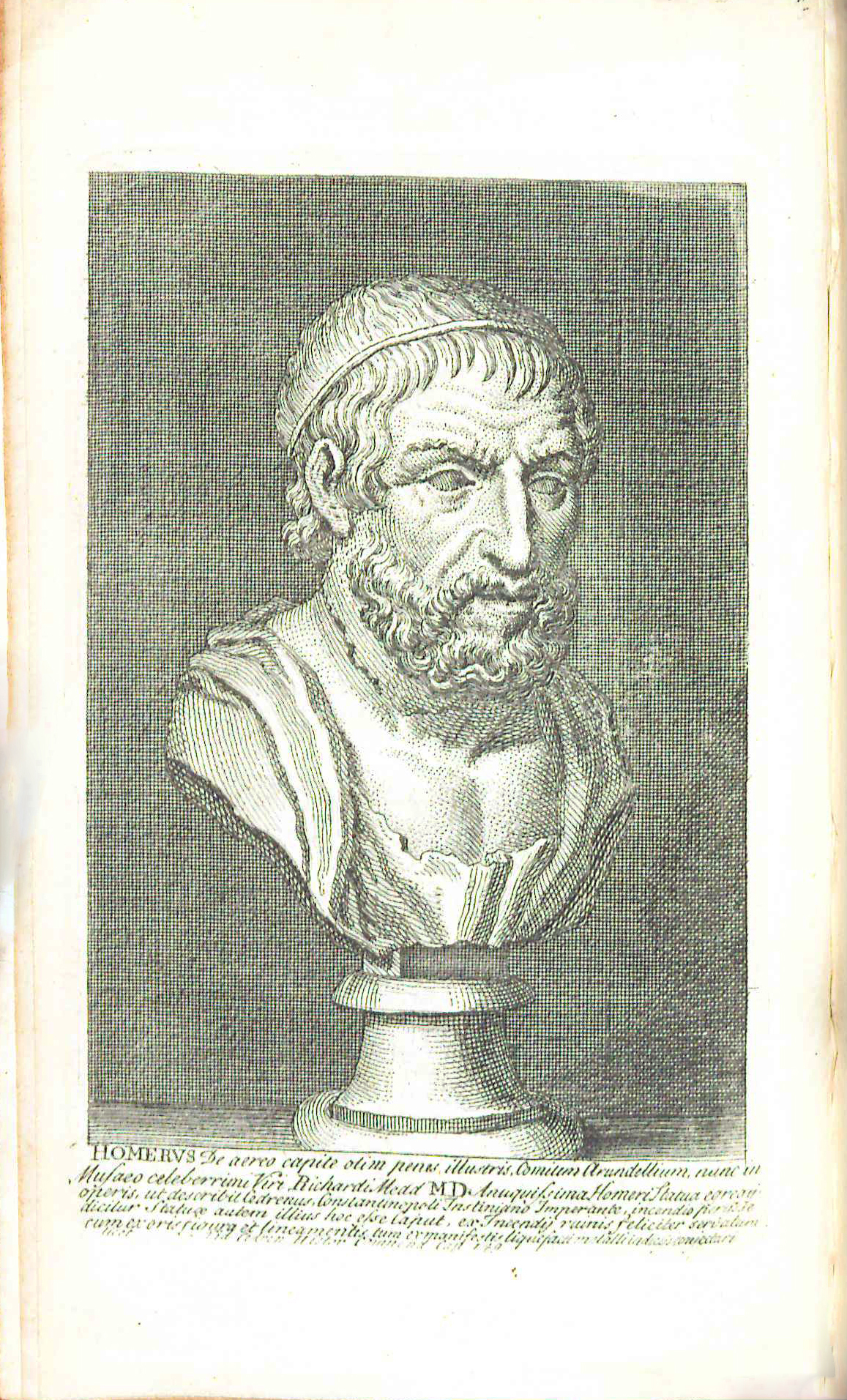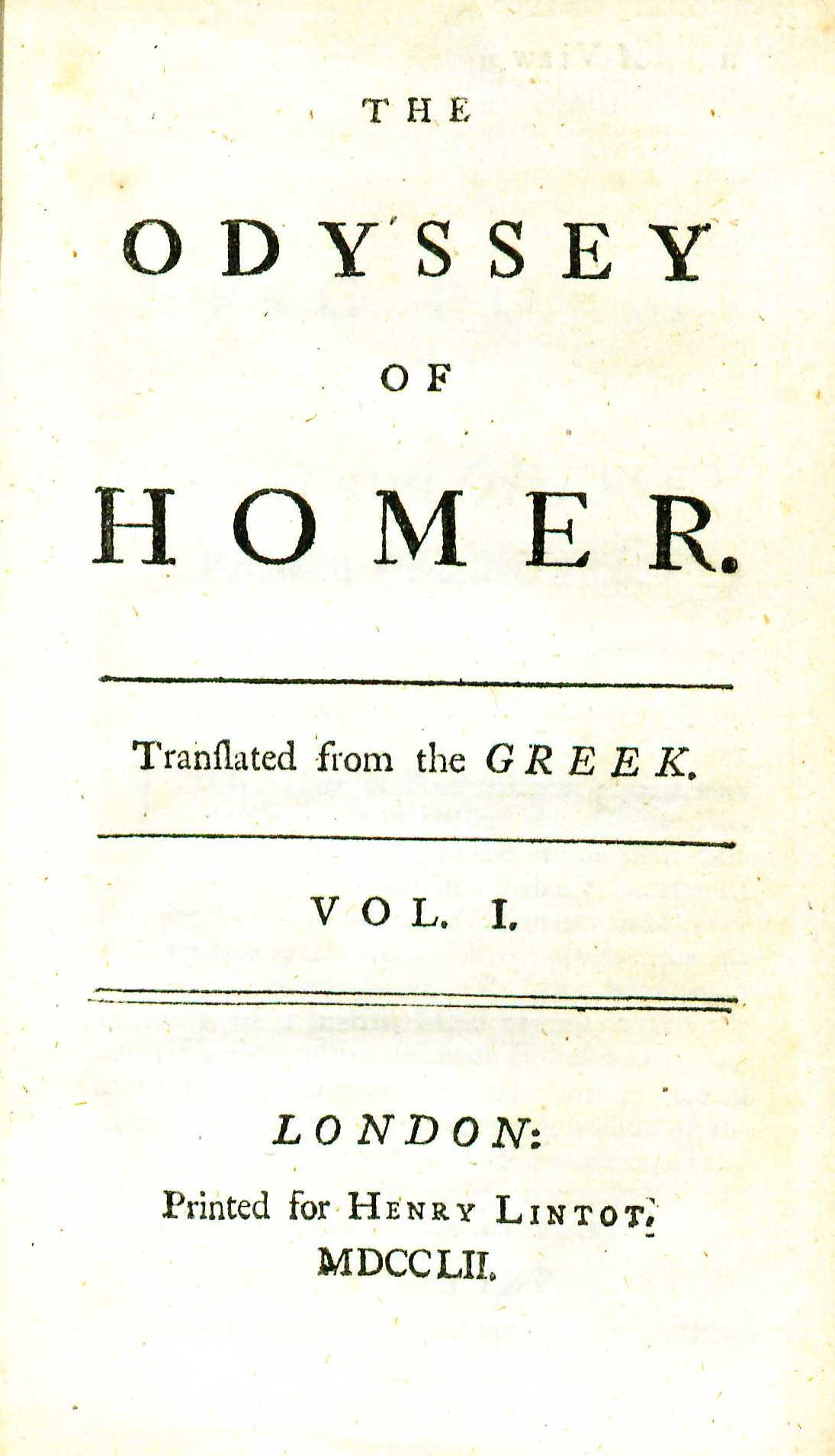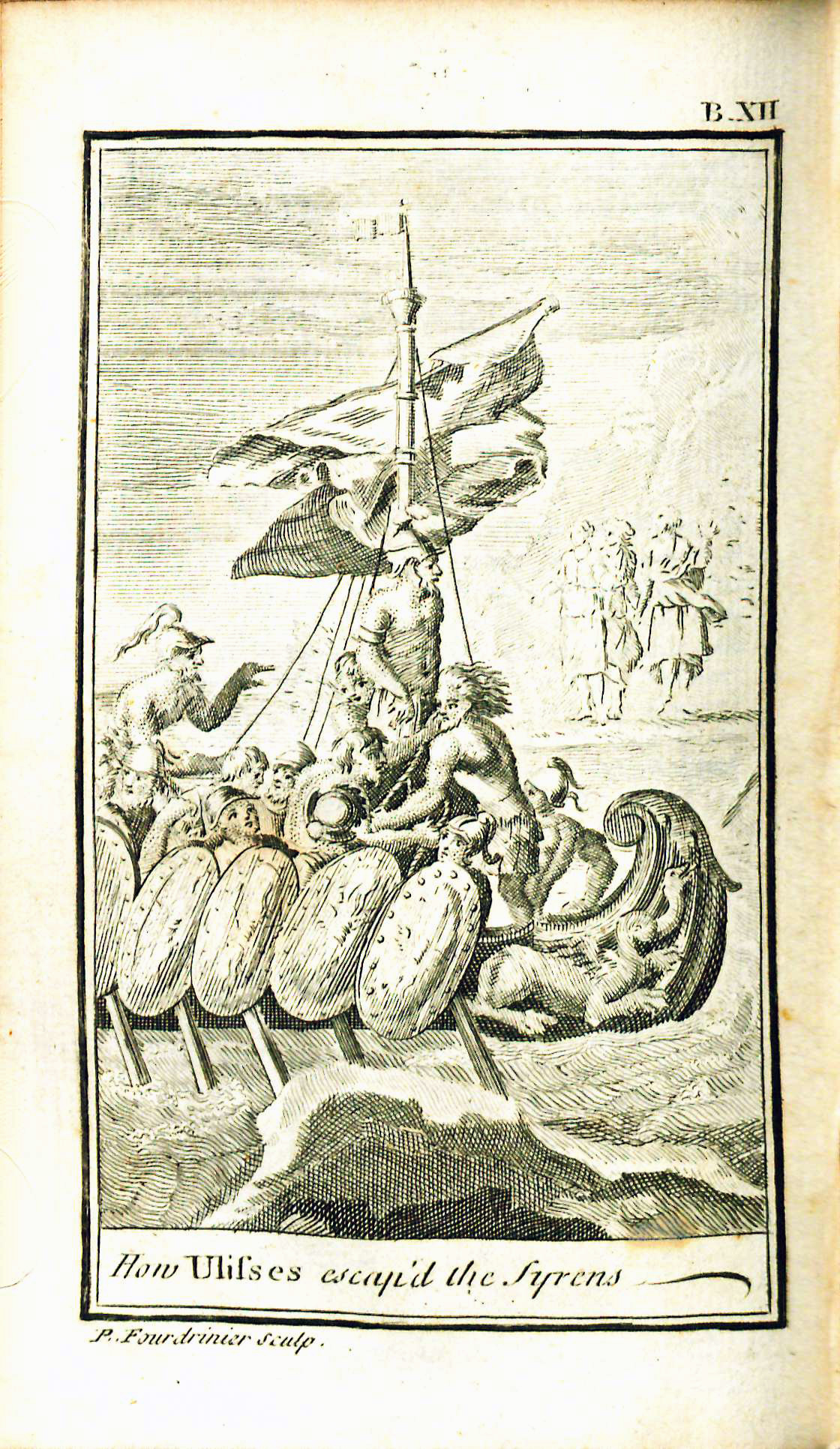Difference between revisions of "Odyssey of Homer"
m |
m |
||
| Line 16: | Line 16: | ||
|desc=[[:Category:Duodecimos|12mo]] (17 cm.) | |desc=[[:Category:Duodecimos|12mo]] (17 cm.) | ||
|shelf=H-4 | |shelf=H-4 | ||
| − | }}[[File:OdysseyOfHomer1752Frontispiece.jpg|left|thumb|270px|<center>Frontispiece portrait of Homer, volume one.</center>]]Little is known about the life of Homer, the poet responsible for the ''Iliad'' and the ''Odyssey''. Herodotus claimed Homer lived around 850 BCE, while modern scholars usually date his poems to the second half of the eighth century BCE.<ref>[http://www.oxfordreference.com/view/10.1093/acref/9780199548545.001.0001/acref-9780199548545-e-1550 "Homer”] in ''The Oxford Companion to Classical Literature'', ed. by M.C. Howatson (Oxford: Oxford University Press, 2011).</ref> The Trojan War is estimated to have occurred at the end of the Mycenaean Age in Greece, around 1200 BCE, meaning that Homer was looking back four centuries to a heroic world much greater in his esteem, than the contemporary world. Homer relied on oral history to compose his poems; this provides some of the basis for the "separatist" view that the two epic poems were not written by the same person, but possibly by a combination of poets. The mixed dialect of Ionian Greek in which each poem was originally written indicates that both poems were written in the east Aegean. This is supported by contextual clues in the poems themselves. The two most plausible locations for the birth of Homer are Smyrna and Chios, but ancient Greeks viewed the poet as a blind minstrel wandering while he composed the poems, which were sung or chanted, accompanied by a lyre.<br/> | + | }}[[File:OdysseyOfHomer1752Frontispiece.jpg|left|thumb|270px|<center>Frontispiece portrait of [[wikipedia:Homer|Homer]], volume one.</center>]]Little is known about the life of Homer, the poet responsible for the ''Iliad'' and the ''Odyssey''. Herodotus claimed Homer lived around 850 BCE, while modern scholars usually date his poems to the second half of the eighth century BCE.<ref>[http://www.oxfordreference.com/view/10.1093/acref/9780199548545.001.0001/acref-9780199548545-e-1550 "Homer”] in ''The Oxford Companion to Classical Literature'', ed. by M.C. Howatson (Oxford: Oxford University Press, 2011).</ref> The Trojan War is estimated to have occurred at the end of the Mycenaean Age in Greece, around 1200 BCE, meaning that Homer was looking back four centuries to a heroic world much greater in his esteem, than the contemporary world. Homer relied on oral history to compose his poems; this provides some of the basis for the "separatist" view that the two epic poems were not written by the same person, but possibly by a combination of poets. The mixed dialect of Ionian Greek in which each poem was originally written indicates that both poems were written in the east Aegean. This is supported by contextual clues in the poems themselves. The two most plausible locations for the birth of Homer are Smyrna and Chios, but ancient Greeks viewed the poet as a blind minstrel wandering while he composed the poems, which were sung or chanted, accompanied by a lyre.<br/> |
<br/> | <br/> | ||
Homer’s ''Odyssey'' is an epic poem consisting of 24 books telling the story of the Trojan War hero Odysseus' ten-year journey trying to get home to his wife Penelope and son Telemachus in Ithaca, where Odysseus is king. This epic is distinct from the ''Iliad'' in that it is a more romantic than heroic/tragic poem. It is clear in the ''Odyssey'' who the “good” and “bad” characters are, and therefore with whom the readers (or more accurately the listeners, as it was intended to be recited orally) should emphathize. Odysseus is shown through much of Greek mythological writing as intelligent and crafty. He tricked Achilles into agreeing to join the Greeks against the Trojans, and tricked the Trojans with the giant wooden horse that helped to end the war. In the ''Odyssey'', Odysseus' familial devotion and "eternal human quality[y] of resolution" contrast with the barbaric creatures he meets on his adventures, as well as with the suitors attempting to woo his wife.<ref>"Homer" in ''Oxford Dictionary of the Classical World''.</ref> Odysseus' humaneness served as a model to Greek men, just as Penelope’s devotion to her husband and home showed Greek women how to behave. The strong moral themes in the ''Odyssey'' in no way take away from the exciting adventures Odysseus encountered, from the Cyclopes to the Lotus Eaters to the Sirens, and to tricking and defeating Penelope’s suitors. | Homer’s ''Odyssey'' is an epic poem consisting of 24 books telling the story of the Trojan War hero Odysseus' ten-year journey trying to get home to his wife Penelope and son Telemachus in Ithaca, where Odysseus is king. This epic is distinct from the ''Iliad'' in that it is a more romantic than heroic/tragic poem. It is clear in the ''Odyssey'' who the “good” and “bad” characters are, and therefore with whom the readers (or more accurately the listeners, as it was intended to be recited orally) should emphathize. Odysseus is shown through much of Greek mythological writing as intelligent and crafty. He tricked Achilles into agreeing to join the Greeks against the Trojans, and tricked the Trojans with the giant wooden horse that helped to end the war. In the ''Odyssey'', Odysseus' familial devotion and "eternal human quality[y] of resolution" contrast with the barbaric creatures he meets on his adventures, as well as with the suitors attempting to woo his wife.<ref>"Homer" in ''Oxford Dictionary of the Classical World''.</ref> Odysseus' humaneness served as a model to Greek men, just as Penelope’s devotion to her husband and home showed Greek women how to behave. The strong moral themes in the ''Odyssey'' in no way take away from the exciting adventures Odysseus encountered, from the Cyclopes to the Lotus Eaters to the Sirens, and to tricking and defeating Penelope’s suitors. | ||
Revision as of 09:11, 3 June 2024
by Homer
| The Odyssey of Homer | |
|
Title page from The Odyssey of Homer, volume one, George Wythe Collection, Wolf Law Library, College of William & Mary. | |
| Author | Homer |
| Translator | Henry Lintot |
| Published | London: Printed for Henry Lintot |
| Date | 1752 |
| Language | English |
| Volumes | 5 volume set |
| Desc. | 12mo (17 cm.) |
| Location | Shelf H-4 |

Homer’s Odyssey is an epic poem consisting of 24 books telling the story of the Trojan War hero Odysseus' ten-year journey trying to get home to his wife Penelope and son Telemachus in Ithaca, where Odysseus is king. This epic is distinct from the Iliad in that it is a more romantic than heroic/tragic poem. It is clear in the Odyssey who the “good” and “bad” characters are, and therefore with whom the readers (or more accurately the listeners, as it was intended to be recited orally) should emphathize. Odysseus is shown through much of Greek mythological writing as intelligent and crafty. He tricked Achilles into agreeing to join the Greeks against the Trojans, and tricked the Trojans with the giant wooden horse that helped to end the war. In the Odyssey, Odysseus' familial devotion and "eternal human quality[y] of resolution" contrast with the barbaric creatures he meets on his adventures, as well as with the suitors attempting to woo his wife.[2] Odysseus' humaneness served as a model to Greek men, just as Penelope’s devotion to her husband and home showed Greek women how to behave. The strong moral themes in the Odyssey in no way take away from the exciting adventures Odysseus encountered, from the Cyclopes to the Lotus Eaters to the Sirens, and to tricking and defeating Penelope’s suitors.
Evidence for Inclusion in Wythe's Library
Listed in the Jefferson Inventory of Wythe's Library twice as Pope’s Odyssey. 5.v. 12mo. and [Pope’s] Odyssey. 5.v. 12mo. Given by Thomas Jefferson to his granddaughters, Ann and Ellen Randolph. The precise edition of the set owned by Wythe is unknown. George Wythe's Library[3] on LibraryThing indicates as much, adding "Five-volume editions in duodecimo were published at London in 1725-26, 1745, 1752, and 1758." The Brown Bibliography[4] lists a 1752 edition published in London, translated by Alexander Pope, based on the copy Jefferson sold to the Library of Congress.[5] The Wolf Law Library followed Brown's recommendation and purchased a copy of the 1752 edition.
Description of the Wolf Law Library's copy
Bound in full leather with gilt-ruled boards, five raised bands and gilt to spine. Purchased from Abbey Antiquarian Books.
Images of the library's copy of this book are available on Flickr. View the record for this book in William & Mary's online catalog.
See also
References
External Links
Read volume three of this book in Google Books.

